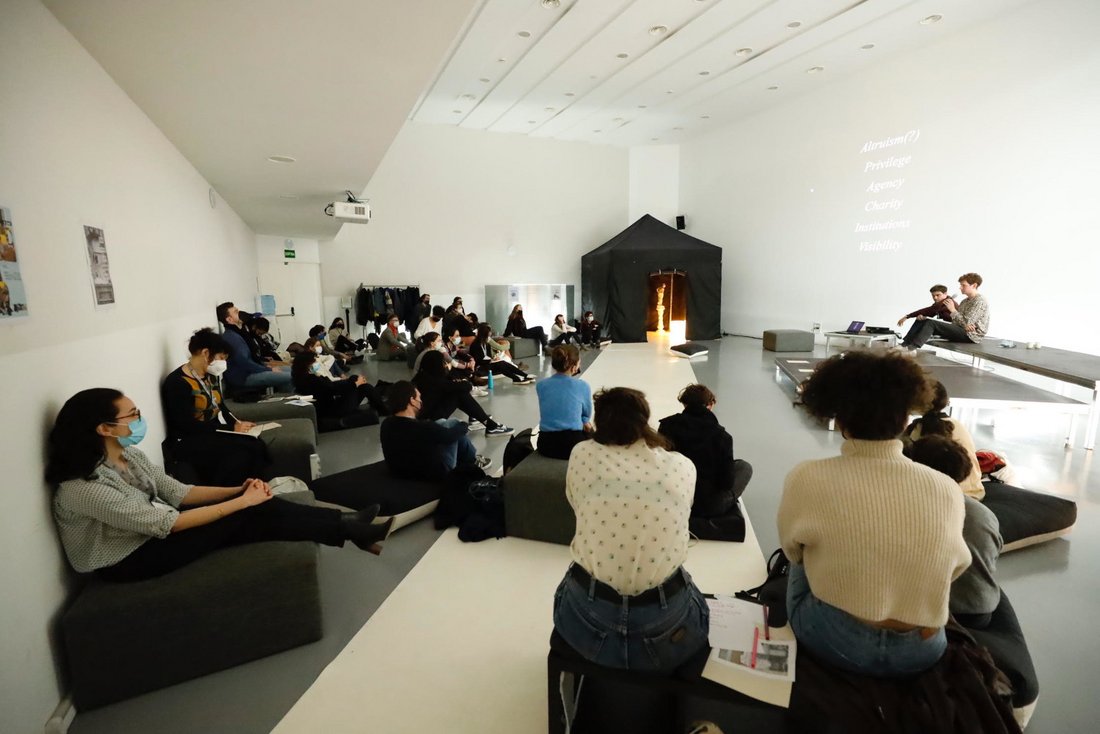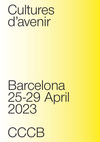Cultures d'avenir 2022-2023
Presentation
Centre Pompidou in Paris, Haus der Kulturen der Welt (HKW) in Berlin and Centre de Cultura Contemporània de Barcelona (CCCB) are launching the second edition of "Cultures d’avenir". The program is made possible with the support of the Franco-German Youth Office (FGYO).
During a six-month period of learning, exchange and networking the program invites young artists to rethink the way of how artistic practice addresses and intersects with societal issues. Far from being an indifferent and disconnected bystander, the question of the role of art and culture becomes inevitable as we currently witness the devastation of the planet in its human and non-human diversity and a flagrant misuse of our common natural and social resources.
Imagining the world as interdependent, artists offer new perspectives for rethinking complex planetary relationships, open up new ways of storytelling, challenging frameworks of knowledge, formulating critiques and bringing hope as part of a process of rehabilitation. How can institutions – these intermediary bodies between citizens and state – provide opportunities for public and artists to experience society outside of productivist and economist paradigms, and encourage new ecologies of care? How can we rethink our practices, our way of learning or unlearning, how can we imagine and anticipate a space for inclusive art, "curative" culture, non-hierarchical exchange and mutual solidarity? Aren't art and culture another form of learning, transmission and "mutation", in line with the conviction of Stuart Hall, pioneer of Culture Studies, that "if we change culture, we make it possible to change the world"?
Detailed programme
PDF - 7 pages - 230 Kb
Detailed programme
PDF - 13 pages - 1.66 Mb
Workshop at Centre Pompidou
June 20–24, 2023
The latest Cultures d'avenir workshop in Paris brings together a variation of practices as a constellation around the concept of "mutation" as utopian space, territory, memory and body conceived by the École des Mutants. Building on the legacy of the University of Mutants in Gorée (Senegal) in 1977, we ask what makes a "good" school, and by extension, a good (cultural) institution.
Drawing further on contemporary dance and the queer and trans*feminist "somatic practices" of philosopher Emma Bigé, this approach seeks to modify and reappropriate the functioning of the subject in relation to its environment and others, as well as ways of knowing and feeling.
Finally, we open up to an alternative vision of the physical enclosure of spaces, while considering the "speculative archive" and plural narratives of plural narrators as promoted by writer-storyteller, curator and film producer Olivier Marboeuf.
We'll be reflecting, dialoguing and acting on these latter themes over the course of a three-day workshop, walks, picnics, lectures, concerts and gatherings scattered between spaces in Paris: Centre Pompidou, Gaité lyrique, Cité Internationale des arts, La Maison de l'ours, and in Montreuil: between the collective space L'Etna, La Cantine Syrienne and La Maison Populaire. Inspired by practices of social justice and ecological engagement developing approaches such as cooperative thinking, mutual action or pedagogical experimentation, we bring together a wide range of diverse cultural actors, artists, activists, researchers and filmmakers to reflect together on the possible future.
Detailed programme
PDF - 15 pages - 1,8 Mb
With École de mutants (Stéphane V. Bottéro, Valérie Osouf), Antonija Livingstone, Sherwood Chen, Helio Dos Santos Horauo, l’Etna (Marie Bottois, Tomaž Burlin, Bani Khoshnoudi), Olivier Marboeuf, Bonaventure Soh Bejeng Ndikung, Judit Carrerra, Mathieu Potte-Bonneville, Paula Comin Valero, La Maison de l’ours (Kristina Solomoukha, Paolo Codeluppi), Initiative for Practices and Visions of Radical Care (Elena Sorokina, Ismail Afghan), Serena Freira, Dj Tio Leo.
Conceived by Eva Daviaud, Simona Dvorák, Linus Gratte, Charlène Dinhut, with contributions from Alice Pialoux, Jeanne Tous and William Ravon.
In partnership with la Gaité lyrique, la Cité Internationale des arts, La Maison de l'ours, L’Etna, La Cantine Syrienne, La Maison Populaire de Montreuil.
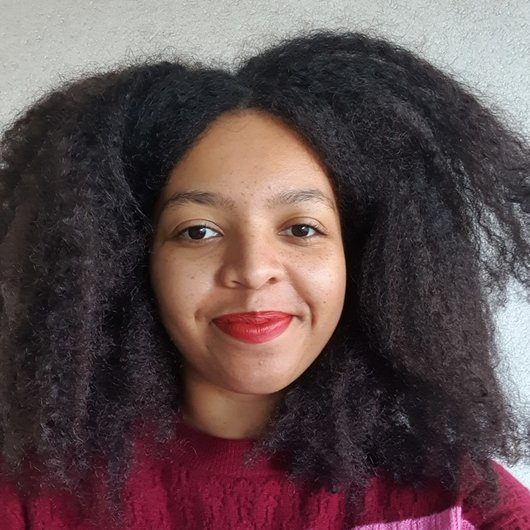
Adji Titus
Adji Titus is a Paris-based artist born in 2000.
After a brief period at EnsAD art school she decided to continue her artistic projects in a different way. She is cofounder of the Thodji collective (Adji Titus and Thomas Jean-Louis). Thodji produced a drawing that was exhibited on a colonne Morris in Paris during the 20th edition of Parcours Saint-Germain x École Kourtrajmé in 2022. She participated in the group show "Camouflage. Behind the Abstract Pattern (Art-Nature-War)" at FeliXart Museum in Belgium in 2020.
She draws in different colours and explores mediums such as screen-printing and etching. She loves humans, discussing, sharing, learning and telling stories, and dreams of hope. Adji would like to draw everywhere and make the sky her limit.
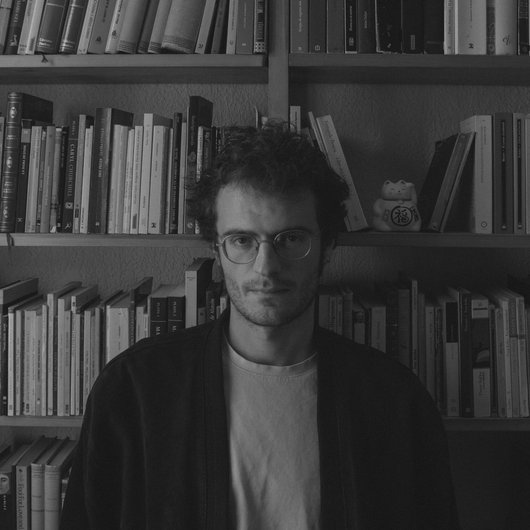
Eduard Olesti
Eduard Olesti is a graduate in Hispanic Philology from the University of Barcelona and has never completed his Direction and Dramaturgy studies at the Institut del Teatre.
Winner of the 2022 Amadeu Oller Poetry Prize, for his poetry collection Sarcop. He is a curator at the Sala d’Art Jove with the bord collective, with which he co-created the situations Apunts teoricopràctics sobre la festa dels súpers (Arts Santa Mònica) and Fenomenologia dels fenòmens de masses u: el libdup (Fundació Brossa). He is co-founder of the company trashèdia AP-7, which won the DespertaLab 2022 grant, and is resident at Nau Ivanow. Dramaturg of Hit Me Fascism One More Time (in residence at the Replika theatre in Bucharest), Rentadora, gira mundial (Nau Ivanow), No tenim ni idea de què és el teatre (FAT), El Congrés de l’Acomodació (Festival Escena Poble Nou), El recel dels núvols (Ses Salines Award) and Una fruita estranya (Roca Umbert).
He has worked as assistant director to Albert Mestres and co-created the performance It’s a bit John Cagey (Divadlo Archa, Prague).
He has written for magazines such as Branca, The posttraumatic and Khaleido.
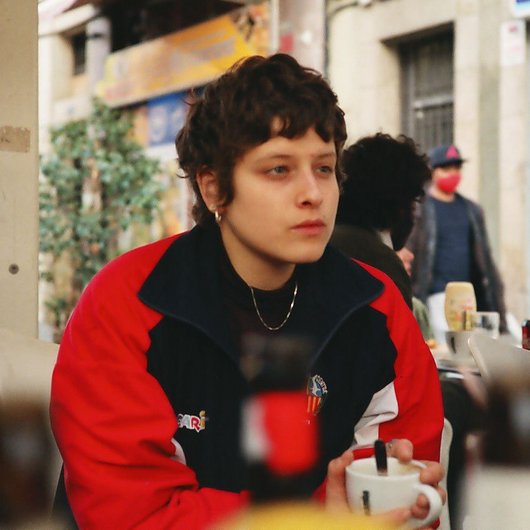
Esther Solé Alarcón
Esther Solé Alarcón is a graduate in Art and Design from the Escola Massana and continues her training in Dance Pedagogy (Institut del Teatre).
Her interests centre on the power of the live arts, collaborative methodologies and dance studies. In her last project, Gracias por estar, presented in the framework of the group show Llama y Vamos (Halfhouse, 2021) and Festival Stripart (Centre Cívic Guinardó, 2022), she worked with responsive devices that catalyse, deploy and articulate learning—embodied experiences—in relation, in process and in context.
She developed a residency-body experimentation laboratory with the group lxsquecorrenporahí at Fabra i Coats (2019-2020) and is involved with La Capella in the co-creation of the activity programme Cicle Catenària (2022). She currently channels her interests through performative research and the arts from an indisciplinary perspective, and, more specifically, is immersed in research into the politicization of grief, with a residency at Fabra i Coats (2023).
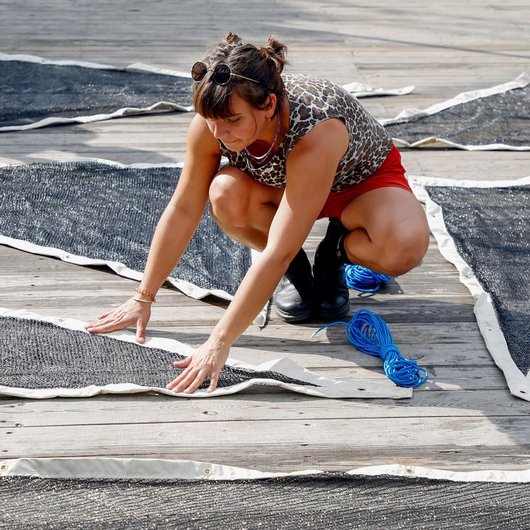
Garance Maurer
Garance Maurer (she/her) is a French independent designer and transdisciplinary artist, specializing in textiles. At the intersection of several fields, she combines fieldwork with the creation of materials, colours, universes, shapes and stories. Transposing the principles of textile construction to the scale of objects, spaces and narratives, she researches the forms of living, creating projects in which processes and encounters matter as much as the final form.
She has a master’s degree in textile design from ENSCI-Les Ateliers (Paris). She has worked in various sectors, from craft to industry, from design to architecture, and from artistic research to collective activism. She has been invited to take part in artistic residencies in Mexico (Alliances Françaises), the French Alps (L’envers des pentes), Corsica (Fabbrica Design), and soon in Hungary (Balatorium, European Capital of Culture). Her work has been exhibited at Villa Cavrois, Musée dauphinois, Centre d’Art La Halle and Biblioteca Vasconcelos, among others.
A firmly situated practice leads her to work and live in different spaces, between Berlin and France. Tending to cultivate alterity, collective practice and community knowledge, she is involved in several spatial, urban and performative practices. She is co-founder of Collectif Trouble and an active member of Floating University Berlin.
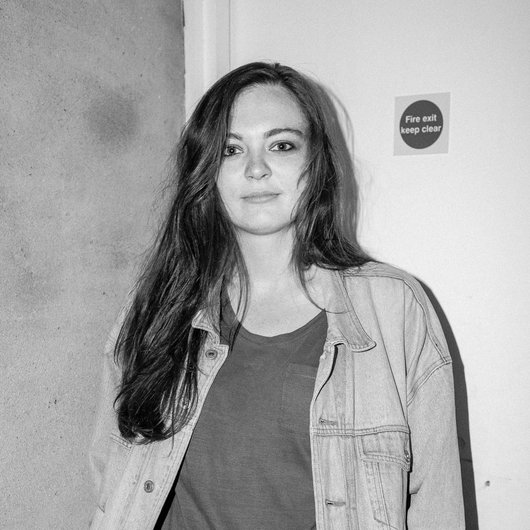
Hanna Grześkievicz
Hanna Grześkiewicz is a curator, writer and researcher working with sound and words.
Her artistic practice centres on the relationship of art with social movements, listening and sonic fictions. She works in collective, participatory and public settings in keeping with her engagement with queer-feminist, migrant and anti-capitalist movements. She is currently working on projects that explore sonic agency in feminist protests and Eastern European sonic fictions through queer-feminism and ecology.
She regularly produces work for radio and co-creates the show "Morning stories" on Warsaw’s Radio Kapitał. She was part of transmediale festival’s 2022 research group, and has presented her work at the Akademie der Künste (Berlin), CTM Festival (Berlin), University of Copenhagen, FU Berlin, and Maastricht University, among others. She has written for a wide range of publications that include Positionen, Gramophone Magazine, Arts of the Working Class, analyse&kritik, jungeWelt, and those of the Rosa Luxemburg Foundation and openDemocracy.
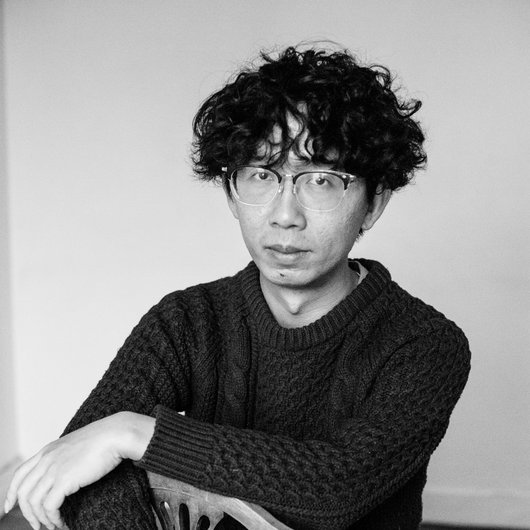
Haonan He
Haonan He was born in the Yunnan region of China. He earned his master’s degree in Art, Technology, Digitalization and Creation at EUR ArTeC-Paris in 2022. He is currently part of the post-diploma art programme of the École nationale supérieure des beaux-arts de Lyon (EnsBA Lyon).
His interdisciplinary multimedia work is based on investigation-creation, cartography, installation and video poetry. His research takes place in the field of colonial mechanisms of self-exploitation of poppy-derived drugs in the history of the Yunnan-Golden Triangle region, experimenting with different protocols of artistic exploration.
He studies the Mandala-Cyberspace cosmology from a decolonial perspective in order to revisit the role of Buddhism in the creation of digital technologies in the 20th century. He has created a methodology of divinatory cartography that he named Geo-divination. He uses this subjective cartography as a tool to capture and visualize objects that are difficult to apprehend using conventional cartography (hyperobjects). In this way, he combines artistic creation with the attempt to predict future developments of objects conceived as post-art manifestations.
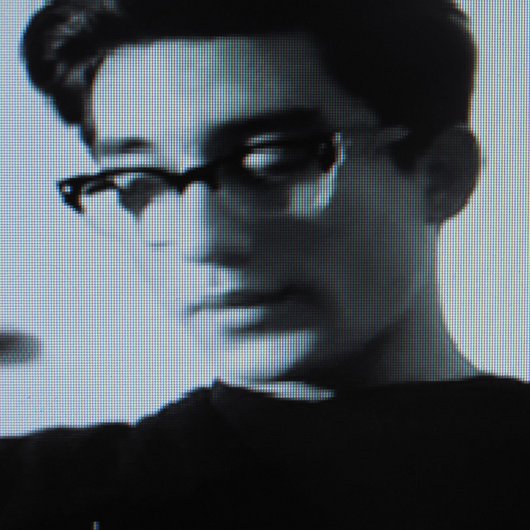
Ibai Gorriti
Ibai Gorriti is a graduate in Communication and Culture Industries from the University of Barcelona with studies in Design from the Escola Massana.
Her practices have focused on the creation of participatory devices, often through performance and situationism. During COVID-19 she co-directed FUTCH club™, a space for meeting and experimenting among queer artists and activists in the Raval.
Ibai is currently researching the gentrification of dissent, the notion of safe spaces and the construction of the healthy subject in the West.
She has participated in public programmes at the Tate Modern (London), Das Neue Alphabet (Berlin), documenta fifteen (Kassel) and Biennale Warszawa (Warsaw), and has collaborated with curators such as DIS and Mohammad Salemy, as well as the research group Art, Arquitectura i Societat Digital.
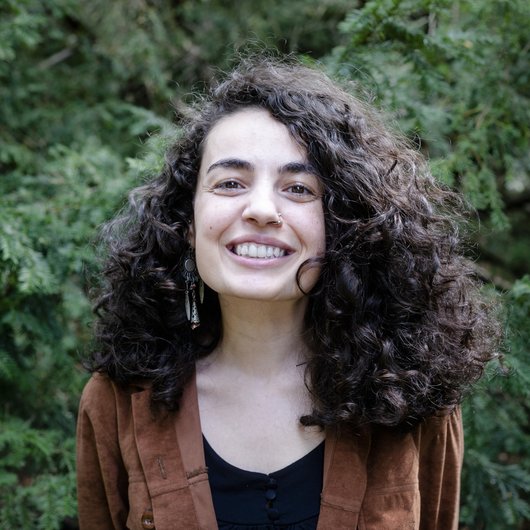
Ipek Çinar
Ipek Çinar (she/her) completed her studies in Political Sciences at METU in 2018 and began her graduate studies in the Art in Context MA programme at UdK Berlin in 2020.
Working predominantly with the photographic medium since 2011, Çınar tells stories that seek to convey an idiosyncratic language by blending photography with writing and research. In addition to her photographic production, she contributes essays, interviews and series of articles to various publications, and acts as a content advisor, particularly on photography. Çınar enjoys the intersection of art and politics, and uses play, joy and unexpected encounters as a means of expression in her socially engaged art projects.
In addition to her artistic production, she also works in the field of anti-discrimination and social justice.
She has had solo exhibitions at Poligon "The Shooting Gallery" (Istanbul) and Ka Atelier (Ankara), and taken part in numerous group shows in various countries. She has been invited to international artist residencies, workshops and festivals, where she participated in exhibition and lecture programmes.
Ipek Çınar, who is also a member of AICA Turkey, has been co-editor of Orta Format since 2015, an initiative that she loves.
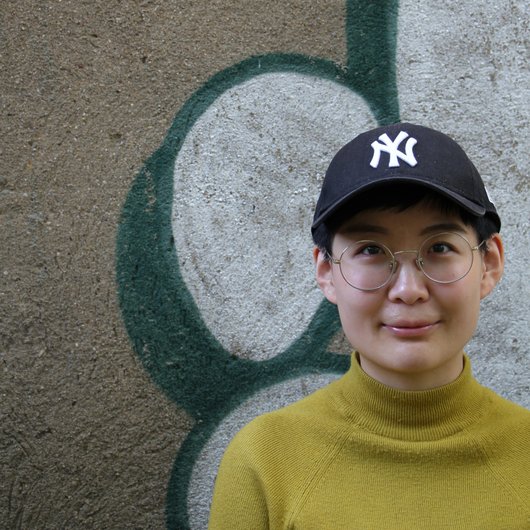
Jingyun Li
Jingyun Li (jingyunli.xyz) is a freelance theatre director, producer and dramaturg.
Li studied Media Studies (Bachelor) and Chinese Languages and Literature (minor) at Fudan University, with an exchange programme in Sociolinguistics at Duke University and Gender Studies at University of California, Santa Barbara. After her master studies in International Dramaturgy at the University of Amsterdam and first project as dramaturg at the 2019 Opera Forward Festival at the Dutch National Opera, she went to Germany in 2019 and interned at Komische Oper Berlin and JTW Spandau.
In her practice, Li uses languages as artistic material to reflect on and reshape ways of writing and speaking, and to question the worldview, ideology and power of languages. Her own interdisciplinary multilingual projects thematically address sexuality, cultural identity, migration and censorship.
Since 2021, Li has co-curated the international programme of Stadttheater Spandau, and currently also works at APAL@AmnAsia and the Performing Arts Festival Berlin.
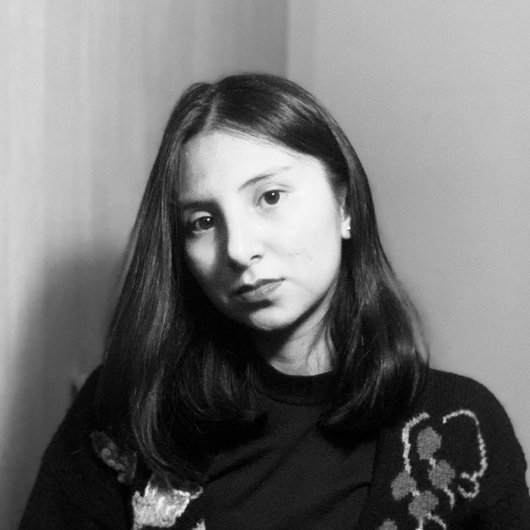
Maria José Porras
Maria José Porras is a graduate in Fine Arts from the University of Quindío.
Since 2016 she has collaborated on audiovisual and journalistic projects centring on environmental protection and social reparation, including the documentaries Vida en la niebla (2016), Manguala (2018), Sembradores de cuerpos (2018-2021), Fábricas de agua (2021) and the transmedia special Cuerpos de agua (2021).
In 2019 she took part in the International Congress of Arts and Cultures in Madrid and the International Seminar of Arts and Humanities in Colombia. She has won three national university journalism awards and exhibited at the 16th International Poster Biennial in Mexico. In 2021 she coordinated the display of posters Kontraste.
She is currently doing a master’s degree in Advanced Studies in Art History at the University of Barcelona, and collaborates at the KBr photography centre of Fundació MAPFRE.
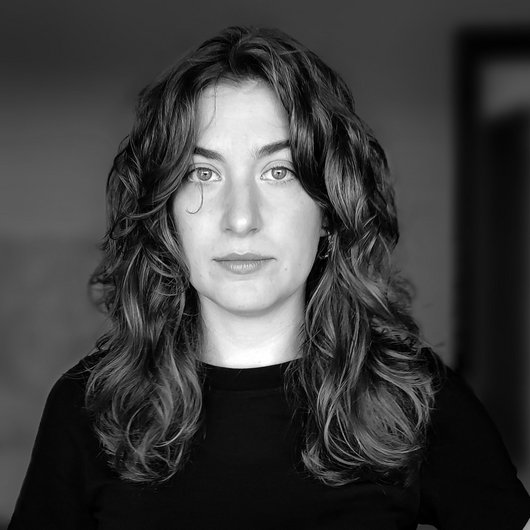
Marina Ribot Pallicer
Marina Ribot Pallicer studied Fine Arts at the University of Barcelona and the Cooper Union for the Advancement of Science and Art in New York. She continued her studies by taking a degree in Art History and a master’s degree in Teacher Training (UB).
Her artistic practice brings together several audiovisual, photographic and pictorial proposals in which she explores and questions different strategies of control and dominance over the body, agriculture or the territory. Some of the artistic projects on which she has worked are: Geografies de guerra: la graella com a infraestructura (2019), Un territori sense la carn que abraça el món és com un 'jo' sense cos (2020) and L’art com a pràctica de cultiu (2021).
She is one of the tentacles of pli-é collective, along with Eva Paià and Angelica Tognetti. From this shared space, they table debates about the creation of new institutionalities and imagine proposals to return the term "curation" to the original etymology that relates it with "care". They worked on the research project "Imaginaris asèptics" in collaboration with Idensitat and La Escocesa in the framework of the European project "ETI – Expérimenter une transformation institutionnelle" (2020-21). At present, they collectively manage Sala d’Art Jove, a space for creation, research and training for young artists that depends on the Generalitat de Catalunya Catalan Government, and collaborate with the Education Department of the MACBA.
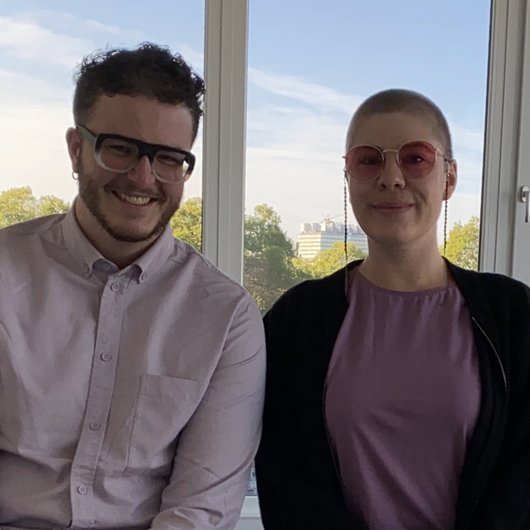
MELT
MELT (Ren Loren Britton & Iz Paehr) study and experiment with shape-shifting processes as they meet technologies, sensory media and pedagogies in a warming world.
MELT currently create projects along four different lines of research: ACCESS SERVER, The Meltionary, Counting Feelings and Zeitgeber. Their arts-design research cooks up practices that generate material and infrastructural transformations at the intersection of Trans* feminism and Disability Justice.
Working with change and MELT(ing) like a kaleidoscope, their work engages multiple topics at once: climate change, the potential for political reformulations, change over time and material transformation.
MELT share work in the form of videos, installations, websites, lectures and workshops.
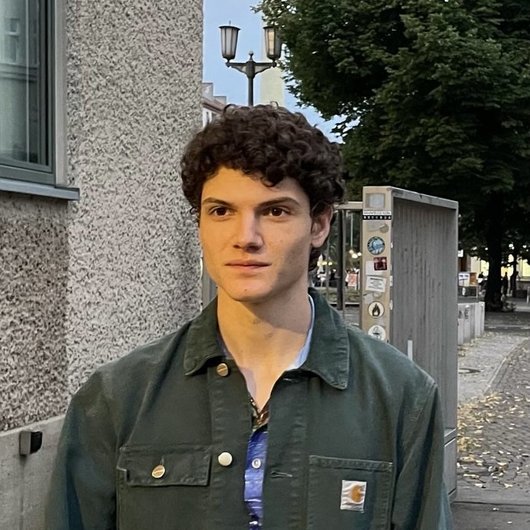
Miguel La Corte
Miguel La Corte was born in Caracas, Venezuela, in 1999.
His current practice centres on instrumenting shared experiences and designing Open Media Ecologies. In more detail, he sees music as a vehicle for agency through experiences of public collective creation, shifting the public notion of creation as a closed process to a new conception of creation as an open and collective process.
In late 2016 Miguel founded Myriorama, an instrument development company originally specializing in the restoration and redesign of electroacoustic pianos. More generally, Myriorama aims to reflect on our shared living circumstances by designing and restoring the instruments and elements that define these spaces. In a cultural landscape dominated by closed-control platforms, he proposes the dissemination of participative musical experiences through online environments as an alternative avenue of connection. As his first prototype of an Open Media Ecologies, he founded the Participative Audio Lab in 2022, an organization that aims to develop open source tools that enable participative music distribution.
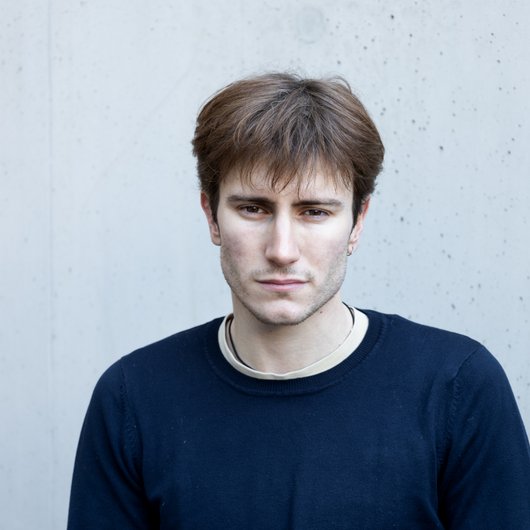
Nàto Bosc-Ducros
Nàto Bosc-ducros is an artist living and working in Paris.
In his works he uses a variety of techniques, revisiting traditional crafts, ceramics, drawing and weaving, and often proposes collaborative performances to manipulate these objects. When activated by performance, the pieces emulate emotional and political tensions, and are inspired by his childhood in the French Caribbean. His works are then set alongside colonial archives, personal documents and video recordings. His immersive spaces are fragile attempts to resist void, silence and violence, interwoven in the framework of Western societies. He trained in ceramic manufacture in Maine-et-Loire and is currently studying a master’s degree at the Ecole nationale supérieure des arts décoratifs (EnsAD) in Paris. One of his creations is a ceramic dress shown in 2022 at the Villa Medicis, where he also read his own poem at the Festival des cabanes. In 2019, he took part in "B comme Bio", a group show at Fondation d’Entreprise Ricard in Paris. His poems have also been published in two French poetry reviews, Bagarre and Opium, both in 2022.
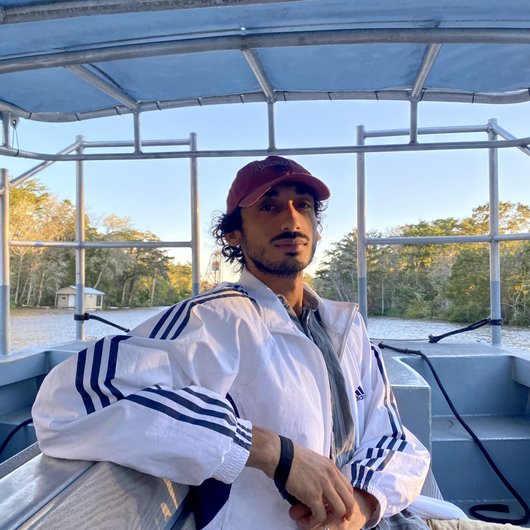
Pierre-Alexandre Savriacouty
Pierre-Alexandre Savriacouty is a French-Malagasy artist born in 1993.
He is a graduate of Montpellier’s School of Fine Arts, where he collaborated with stage director and writer Rodrigo Garcia. He also graduated from the EnsBA in Paris in 2022.
His practice explores issues related to disappearance, memory, identity, water and its spirituality, the living, remains, shamanism, cryptography and the transformation of matter by means of social and climatic disruption. The hidden dimension of the depths of water fascinates him and leads him to explore invisible and ancient worlds in an attempt to communicate with and through them. His work is the result of infinite research into the flow of water and, most particularly, its disappearance. His sculptures are, for him, psychical and memorial anchors; in water and rivers he finds the ability to bring to the surface hidden memories and signs, buried voices and water spirits.
His work has been exhibited at the FRAC Paris-Château de Rentilly, the Saint Paul de Vence International Biennial and, more recently, the Centre d’art contemporain Chanot (France).
In 2022, he was artist in residence at Villa Albertine in Chicago.
